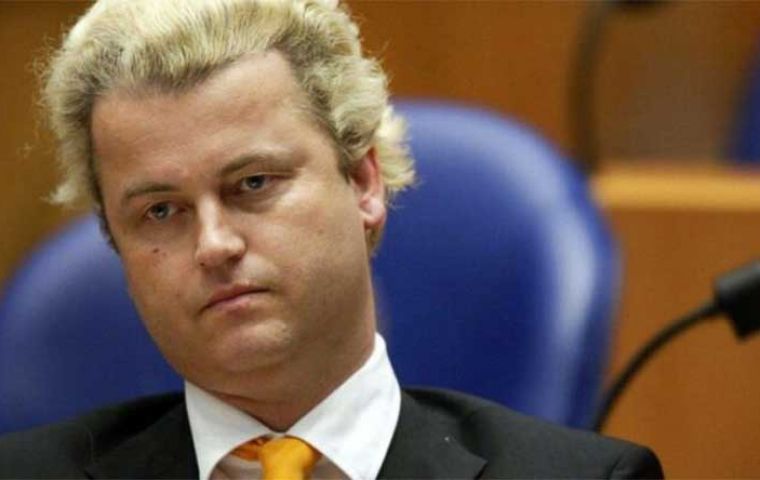MercoPress. South Atlantic News Agency
An extreme populist anti migration candidate wins a great victory in Netherlands
 Geert Wilders with his 37 votes, out of 150 in parliament, still needs to organize a ruling coalition, with 76 members, but will send shock waves across Europe.
Geert Wilders with his 37 votes, out of 150 in parliament, still needs to organize a ruling coalition, with 76 members, but will send shock waves across Europe. Reflecting the Netherlands' people's concern with immigration and European Union policies, an extreme populist leader, with his Freedom Party (PVV), has won the general election, with a clear difference over a left-wing alliance runner-up.
The victory and if finally Geert Wilders with his 37 votes, out of 150 in parliament, is capable of organizing a ruling coalition, with 76 members, will also send shock waves across Europe.
Wilders, who received congratulations from ex US president Trump, intelligently took advantage of widespread migration frustration promising “closed borders” and even dared to consider banning mosques and the Koran.
Before the vote, the three other big parties ruled out taking part in a Wilders-led government because of his far-right policies. But that might change because of the scale of his victory. The left-wing alliance under ex-EU commissioner Frans Timmermans has come a distant second with 25 seats.
He made clear he would have nothing to do with a Wilders-led government, promising to defend Dutch democracy and rule of law. “We won't let anyone in the Netherlands go. In the Netherlands everyone is equal,” he told supporters. That leaves third-placed centre-right liberal VVD under new leader Dilan Yesilgöz, and a brand new party formed by whistleblower MP Pieter Omtzigt in fourth.
Mr Wilders made a direct appeal to his political rivals to work together, and both Ms Yesilgöz and Mr Omtzigt congratulated him on his success. Although Ms Yesilgöz doubts Mr Wilders will be able to find the numbers he needs, she says it is up to her party colleagues to decide how to respond.
Before the election she insisted she would not serve in a Wilders-led cabinet, but did not rule out working with him if she won. Mr Omtzigt said initially his New Social Contract party would not work with Mr Wilders, but now says they are “available to turn this trust [of voters] into action”.
Nationalist and far-right leaders around Europe praised Wilders achievement. In France, Marine Le Pen said it “confirms the growing attachment to the defense of national identities”.
Wilders wants to hold a referendum to leave the EU, dubbed a “Nexit”, although he recognizes there is no national mood to do so. He will have a hard time convincing any major prospective coalition partner to sign up to that.
He tempered his anti-Islam rhetoric in the run-up to the vote, saying there were more pressing issues at the moment and he was prepared to “put in the fridge” his policies on banning mosques and Islamic schools.
The strategy was a success, more than doubling his PVV party's numbers in parliament.




Top Comments
Disclaimer & comment rulesCommenting for this story is now closed.
If you have a Facebook account, become a fan and comment on our Facebook Page!